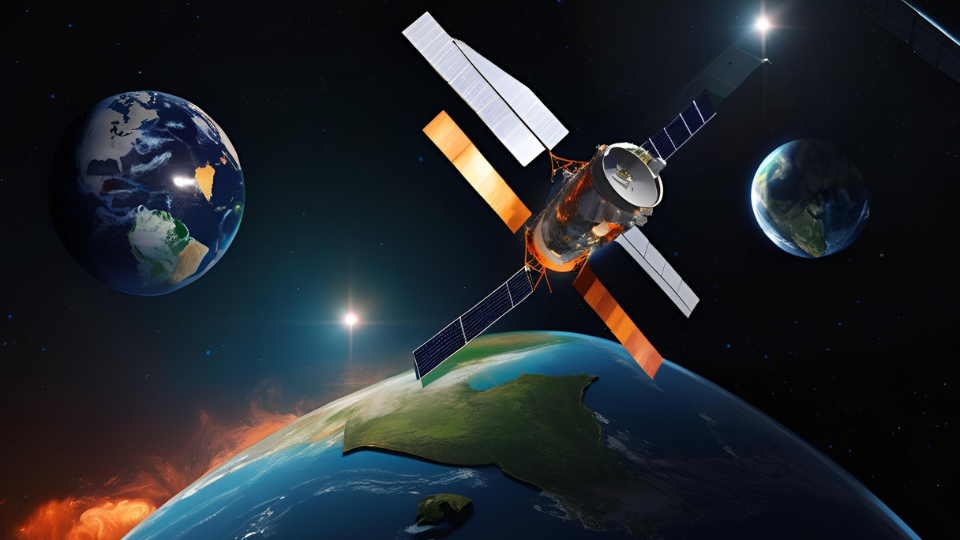In this blog, we will dive into the booming SpaceTech startups ecosystem in India, exploring the innovative companies, cutting-edge technologies, challenges, and future trends.
India has been an integral part of the global space community for decades, with its space agency, ISRO (Indian Space Research Organisation), gaining worldwide recognition for its space missions, including the landmark Chandrayaan missions to the Moon and the Mangalyaan mission to Mars. However, beyond the governmental efforts of ISRO, India’s SpaceTech sector is undergoing a remarkable transformation, driven by an emerging group of private startups that are reshaping space exploration, satellite technology, and space tourism.
From launching small satellites to creating affordable rockets and venturing into space tourism, Indian startups are pushing the boundaries of what’s possible. Buckle up as we embark on a journey into the final frontier, showcasing how SpaceTech startups in India are pioneering space exploration.
What is SpaceTech?
SpaceTech refers to the broad range of technologies used for exploring, studying, and utilizing space. This includes the development of rockets, satellites, space exploration tools, propulsion systems, and space-based services such as communication, navigation, Earth observation, and even space tourism. The SpaceTech industry covers everything from sending satellites into space to designing technologies that enable humanity to live and work in space.
The Indian space industry has long been led by ISRO, but the rise of private companies in the SpaceTech sector has opened new doors for innovation, investment, and commercial opportunities.
Why SpaceTech is Important for India?

The role of SpaceTech for India goes beyond space exploration—it directly impacts the country’s economy, security, and technological growth. Here are several reasons why SpaceTech is becoming increasingly vital for India:
1. Economic Growth and Job Creation
SpaceTech fosters innovation, drives investment, and creates high-tech jobs in fields such as engineering, software development, data science, and manufacturing. India’s space ecosystem is attracting both domestic and international investors, and this trend is set to accelerate.
2. National Security
Space-based technologies, such as satellite imaging, GPS systems, and remote sensing, play a crucial role in strengthening national defense and ensuring the security of the country.
3. Advancements in Communication and Navigation
With satellites playing a major role in telecommunications, broadcasting, internet connectivity, and navigation, India’s space ventures ensure better connectivity and infrastructure development, especially in rural areas.
4. Earth Observation and Sustainability
SpaceTech also enables Earth observation, which is invaluable for disaster management, agriculture, weather prediction, and environmental monitoring. Indian startups are leveraging satellite data to solve complex problems related to climate change, resource management, and sustainable agriculture.
Emerging SpaceTech Startups in India

India is witnessing a boom in SpaceTech startups, with entrepreneurs and scientists coming together to build innovative solutions that cater to the growing demands of the space industry. These startups are breaking barriers in satellite technology, space exploration, and related services. Below are some of the pioneering SpaceTech startups in India:
1. Skyroot Aerospace – Building the Future of Rockets
Skyroot Aerospace is India’s first private company to develop rockets for space missions. The company is focused on building cost-effective, high-performance rockets for launching satellites into space. Skyroot’s vision is to make space exploration more affordable, accessible, and sustainable.
- Innovative Technology: Skyroot’s Vikram-series rockets aim to provide flexible and affordable satellite launches. The company has successfully tested several critical technologies, including cryogenic propulsion.
- Why it Matters: Skyroot is reducing the cost of satellite launches, which opens up new commercial opportunities for private companies, research institutions, and even countries that wish to send satellites into space.
2. Agnikul Cosmos – Custom Rockets for Small Satellites
Agnikul Cosmos focuses on developing small, customized rockets for launching small satellites into space. The company has designed Agnibaan, a customizable rocket that can launch payloads into low Earth orbit (LEO).
- Innovative Technology: Agnikul is focused on creating tailored rockets that meet the specific needs of customers. This flexibility in design allows the company to serve a wide range of industries, including telecommunications, defense, and Earth observation.
- Why it Matters: Agnikul’s affordable and flexible rockets make space access more accessible for businesses and startups globally.
3. Bellatrix Aerospace – Green Propulsion for Space Travel
Bellatrix Aerospace is pioneering the development of green propulsion systems for space travel. The company is working on innovative ion engines and green propellants that make space travel more efficient and sustainable.
- Innovative Technology: Bellatrix aims to create propulsion systems that will be more eco-friendly and efficient than traditional chemical propellants used in space missions.
- Why it Matters: With growing concerns over the environmental impact of space exploration, Bellatrix’s technologies can significantly reduce the carbon footprint of space missions.
4. Vyom Space – Making Space Tourism a Reality
Vyom Space is one of India’s leading startups in the space tourism domain. The company aims to make space travel accessible to civilians, including offering suborbital flights for space tourists.
- Innovative Technology: Vyom Space is working on human spaceflight technologies that will allow non-professional astronauts to travel to space.
- Why it Matters: As space tourism gains momentum globally, Vyom Space is positioning India as a key player in this rapidly emerging sector.
5. Pixxel – Earth Observation Satellites
Pixxel is a satellite imaging company that provides high-resolution Earth observation data to monitor environmental changes, agricultural activities, and urban planning.
- Innovative Technology: The company operates a fleet of small satellites that collect critical data on the Earth’s surface, providing valuable insights into climate change, deforestation, and disaster response.
- Why it Matters: Pixxel is enabling businesses, governments, and research institutions to make more informed decisions about the environment and natural resources.
6. SatSure – Space-Based Solutions for Agriculture
SatSure is leveraging satellite data and AI to help farmers make better decisions regarding crop management, irrigation, and weather forecasting.
- Innovative Technology: The company uses satellite imagery and machine learning models to provide actionable insights to farmers, helping them improve yield and reduce losses.
- Why it Matters: SatSure’s technology is helping India’s agricultural sector, which is highly dependent on weather patterns, to become more efficient and resilient.
Challenges Faced by SpaceTech Startups in India

Despite the rapid growth of SpaceTech in India, these startups face several challenges:
1. High Capital Investment
Building rockets, satellites, and space-based systems requires high capital investment, which can be a significant barrier to entry for new startups. Securing funding is a key challenge for many SpaceTech companies.
2. Regulatory Hurdles
The Indian government has strict regulations for the space sector. SpaceTech startups must navigate complex policies and compliance requirements before they can launch their products and services.
3. Technical Expertise
Developing cutting-edge space technology requires highly specialized skills, and there is a shortage of talent in India in fields such as aerospace engineering, propulsion technology, and space data analysis.
4. Infrastructure and Testing Facilities
Many startups face a lack of advanced testing facilities and infrastructure for testing space technologies. This can lead to delays in product development and testing.
The Future of SpaceTech in India

The future of SpaceTech in India is incredibly bright, with several exciting trends on the horizon:
1. Affordable Space Travel
As companies like Vyom Space continue to develop suborbital flights, space tourism will become more accessible. India could play a major role in providing affordable space travel options in the coming years.
2. Expansion of Satellite Networks
The demand for satellite networks for communication, navigation, and Earth observation is growing. Indian startups are well-positioned to create low-cost, high-performance satellites that can serve global markets.
3. Collaborations with ISRO
India’s ISRO is collaborating with private startups, allowing them to use ISRO’s infrastructure and expertise. This partnership is accelerating innovation in space exploration and satellite technology.
4. Sustainability in Space Exploration
With increasing concern over the environmental impact of space missions, sustainable space exploration technologies will play a crucial role. Companies like Bellatrix Aerospace are pioneering green propulsion systems that could revolutionize space missions.
Conclusion
India’s SpaceTech startup ecosystem is on the rise, with young companies building innovative solutions that are transforming space exploration, satellite technology, and space-based services. From developing affordable rockets and green propulsion systems to making space tourism a reality, India is stepping up to become a global leader in the space industry.
With continued innovation, government support, and global partnerships, India’s SpaceTech startups are set to pioneer the final frontier. Whether you are a budding entrepreneur, a space enthusiast, or someone passionate about technology, now is the time to look up at the stars and dream big—India’s SpaceTech revolution has just begun!
Disclaimer:The content provided in this blog post is for informational purposes only. The opinions expressed here are those of the author and do not necessarily reflect the views or opinions of Business Rahi. While we strive to ensure the accuracy and reliability of the information presented, we cannot guarantee the completeness, reliability, or suitability of the content for any particular purpose. Any reliance you place on such information is strictly at your own risk.
Buisiness Rahi is not responsible for any losses or damages arising from the use of the information shared in this blog post. We may feature links to external websites, but these do not constitute endorsements or recommendations. We encourage readers to conduct their own research and consult with professionals before making any business decisions.
For more information about our brand or policies, please refer to our official website or contact us directly.

